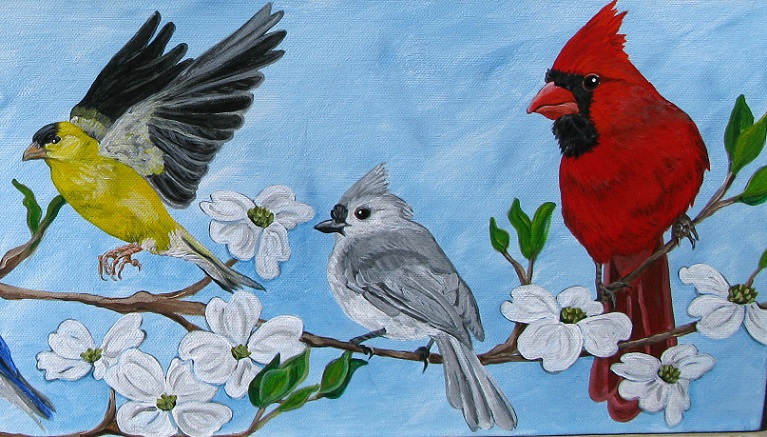Sonnet for a Homecoming
Best way of all to be welcomed back at last,
Returning home from months of life abroad:
Spring songs of birds arouse me from my fast,
Spill into empty house and littered yard.
And now downpouring early morning rain
Releasing scents of fresh green grass and leaves.
It drums on drains, against the windowpane,
Collects on tips of limbs and washes eaves.
Before me stretches out May’s splendid days
And all of summer’s brilliance—all three months.
Now freed of teaching, meetings, grading essays,
I’ll dedicate my energies to private triumphs
And welcome all that come of their own free will—
The titmouse, cardinal, white-throat and whip-poor-will.
I Give Thanks all Day
after William Stanley Braithwaite
I give thanks all day for the purring of cats,
For spring and fall and losses,
For migrating birds and the mystery of bats,
For the softness of feathers and mosses.
I rejoice in my curiosity’s wandering bent
That steers me beyond the mundane,
Where imagination takes off like a bird aloft
To soar above the clouds and rain.
I give thanks all day for the mud and muck,
For the pure lusciousness of mangroves,
For little mud clams that crawl across toes,
And pink stilted clouds of flamingos.
I give thanks when words flow, cartwheel and spill,
When I sing myself utterly away
Like Basho’s cicada shell empty and still
End of the last summer day.
I rejoice in discovery
And the great unknowing,
For all that is coming
And all that is going,
For the example of the albatross
With his wingbeatless gliding
Reminding me to cease
From my endless striving.
I give thanks all day
For the rapture and despair,
For all that is missing
And all that’s still there.
Diana Woodcock teaches composition, creative writing, and environmental literature in Qatar at Virginia Commonwealth University’s branch campus, VCUarts Qatar. She is the author of seven chapbooks and three poetry collections: Tread Softly, Under the Spell of a Persian Nightingale, and Swaying on the Elephant’s Shoulders (winner of the 2010 Vernice Quebodeaux International Women’s Poetry Prize). Her poems have been nominated for the Pushcart Prize and Best of the Net Award, as well as performed live on stage in Lincoln Park, San Francisco at Artists Embassy International’s 21st Dancing Poetry Festival.















“Sonnet for a Homecoming” is striking, especially the second quatrain:
And now downpouring early morning rain
Releasing scents of fresh green grass and leaves.
It drums on drains, against the windowpane,
Collects on tips of limbs and washes eaves.
Not only is the meter precise, but the omission of a finite verb in the first two lines (with dependence instead on the participles “releasing” and “downpouring”) is a sophisticated touch, reminiscent of Greek or Latin verse. The following two lines make up for the missing verb by giving us three separate verbs for the understood subject “rain”: (“drums, “collects,” “washes”).
My only suggestion would be to remove the hyphens in “whip-poor-will,” which seem unnecessary and distracting.
To the reader at SCP: With hyphens is, in fact, the correct way to spell “whip-poor-will”: https://www.merriam-webster.com/dictionary/whip-poor-will
The Woodcock has long been one of my favorite birds; so I am glad to meet one in person. “Sonnet for a Homecoming” is lovely indeed. Like water, it both flows and reflects.
I concur with everything Joe S. says, with one addition — I would also remove the hyphen from “whitethroat.”
“I Give Thanks All Day” has images to which I respond; nature is always creeping into my work — often in unexpected ways. However, to me, meter is of prime importance, Because of this, I find the way it hops around distracting. As an experiment, why not try making two poems out of this one?
In any case, I enjoyed your work and hope to see more. Thanks!
To the reader at SCP: With a hyphen is, in fact, the correct way to spell “white-throat” when referring to the white-throated sparrow: https://www.merriam-webster.com/dictionary/white-throated%20sparrow
I don’t know all that much about our birds,
But I know something of the flow of words,
And here we’ve seen an affluence of diction,
An unimpeded flow devoid of friction.
And I like the heterometric stanzas, despite how much they might irk other readers. If we don’t hear from you soon again, it will be our own loss.